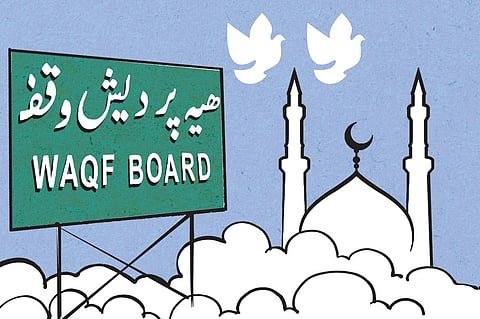The institution of Waqf is an Islamic endowment of property for religious or charitable purposes. This institution has historically served as a pillar of socio-economic welfare, community development and addressing inequality. According to estimates, 872,000 registered Waqf properties exists in India, making it the largest Waqf portfolios globally, second only to the Indian Railways and the Ministry of Defence in terms of possession of land. These properties are valued at approximately ₹1.2 lakh crore (around $14.4 billion), spotlighting the potential to generate substantial revenue for education, healthcare, and poverty alleviation. However, the actual yield stands at less than 163 crore annually, less than 1% of their estimated potential. This stark underperformance is due to administrative pathologies in the Waqf boards, corruption, decay, irregularities in documentation, and the lack of accountability measures. Besides these, the issue of encroachment, outdated management practices, and legal ambiguities have plagued Waqf administration. Recognizing these pitfalls, the Government of India enacted the Waqf (Amendment) Act, 2025, also known as the UMEED Act (Unified Waqf Management, Empowerment, Efficiency and Development) with the intention of modernising the framework and unlocking the inclusive potential of Waqf assets.
The new legislation introduces a series of reforms aimed at transparency, accountability, and inclusivity. One of the most transformative provisions is the mandatory record keeping and digital registration of all Waqf properties on the centrally administered portal. This move is expected to curb duplication, fraud, and mismanagement, while enabling real-time tracking and public access to property records The addition of audits is a significant step, obligating institutions earning more than 1 lakh annually to mandatory audits, ensuring financial transparency and reducing scope for corruption The abolition of the concept of “Waqf by user”, which previously allowed properties to be declared Waqf based on long-term religious use, is believed to be a concrete step towards efficiency of the administration of waqf. This change aims to reduce disputes and clarify ownership, removing the concerns about derecognition of historically significant properties. The reform Act further empowers revenue officials to adjudicate claims, ensuring impartiality and legal clarity.
The cornerstone of the UMEED Act can be attributed to the clauses of inclusivity and expansion of membership beyond singular identity. It is mandated that at least two Muslim women should be included in official positions along with non-Muslim members. This diverse representation is designed to broaden perspectives, enhance decision-making, and ensure that governance reflects the pluralistic ethos of indian society. Moreover, the Act protects the inheritance rights of Muslim women, ensuring that Waqf creation does not override their legal entitlements. The Act also reduces the mandatory contribution from Waqf institutions to the Boards from 7% to 5%, allowing more funds to be directed toward charitable initiatives.
The inclusion of judicial access to appeal against Waqf Tribunal decisions is now permitted in High Courts, addressing the issue of legal revision and offering an additional layer of legal recourse. The Government’s emphasis on the reforms can be argued to be rooted in global best practices and aims to professionalise Waqf management without compromising its spiritual essence. Indeed. Malaysia offers valuable lessons as it has pioneered cash Waqf and corporate Waqf models to fund hospitals, universities, and other development projects. The Malaysian example demonstrates the evolution of Waqf from passive landholding to dynamic engines of socio-economic growth. India can adopt similar strategies, especially by monetizing commercially viable Waqf properties, investing in professional property management, and leveraging technology such as GIS mapping and blockchain for record-keeping. This would not only enhance revenue generation but also restore community trust and attract new endowments.
The current Waqf management ecosystem is suffering from the lack of professional expertise and decentralized administration. It is necessary to train mutawallis (caretakers) and Waqf Board members in modern management practices, legal compliance, and digital tools, which can significantly improve governance Institutions like Aligarh Muslim University and Jamia Millia Islamia could play a pivotal role by offering executive courses and certification programs in Waqf administration. The modernization of Waqf governance in India is not merely a legal reform; it is a socio-economic imperative. By embracing transparency, inclusivity. and professionalization, the country can transform Waqf from a dormant legacy into a vibrant instrument of inclusive growth. The UMEED Act represents a bold step in this direction, offering hope that Waqf will fulfill its foundational promise of serving the community and advancing social justice
-Altaf Mir, PhD, Jamia Millia Islamia











